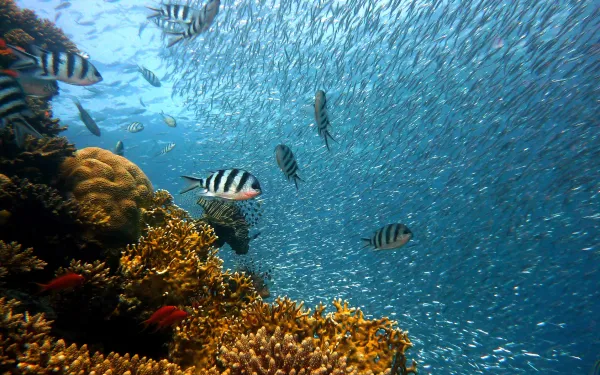
Project
Photo: Ana Rodríguez Carrington (CC BY 2.0)Victory: Biosphere Reserve in Baja California Saved from Toxic Mine
Known as an “ecological treasure house,” the Sierra La Laguna Biosphere Reserve at the southern tip of Baja California will not be spoiled by toxic mine waste, thanks in part to AIDA’s advocacy.
The reserve was once an island, so it’s home to rare plant and animal species. Canyons, swimming holes, and hot springs can be found in its granite mountain range and lowland tropical forests.
Thanks to AIDA and our partners in Mexico, the Mexican government denied an environmental permit for the Paredones Amarillos gold mine, halting the project for the time being. To protect the biosphere reserve, AIDA helped educate community groups and decision makers about the mine's risks. This helped to build the political momentum necessary for the government to deny the permit.
To extract gold from the mountains, the Canadian company Vista Gold proposed to carve out huge quantities of rock—each ton containing a mere gram of gold–-grind it into sludge, and treated it with cyanide. The company planned to dump massive amounts of toxic waste (called “tailings”) behind a dam intended to store it forever. Unfortunately, tailings dams can break for various reasons, as happened at Bolivia’s Porco mine in 1996. When that dam collapsed, more than a quarter million metric tons of tailings flooded the river and contaminated 500 miles (800 km) of waterways in Bolivia, Argentina and Paraguay.
The mine could also cause acid mine drainage. When sulfur-containing rocks are exposed to air and water, sulfuric acid forms, which causes toxic heavy metals to dissolve and drain into the watershed. The risk of acid mine drainage in Sierra La Laguna was significant and the human and environmental cost would have been tremendous: thousands of people and countless wildlife in the reserve rely on its water for survival.
Depleting freshwater is a further threat because mines use tremendous quantities of water. Owing to the scarcity of water in the reserve, Vista Gold proposed to build a plant on the Pacific coast to remove salt from sea water in a highly energy-intensive process, and then pump the water 45 km to the mine site. The desalination plant posed a threat to the endangered leatherback sea turtle.
Singly and together, the mine’s impacts would have devastated a rare jewel, a unique and lush paradise worth saving for future generations.
Related projects

The challenges of deploying wind energy in Mexico. The case of the Isthmus of Tehuantepec
To combat climate change, low-carbon projects such as wind farms must be promoted. But despite the urgency for renewable energy, these projects must be carried out in a sustainable and equitable fashion. This article is an open call to Mexico and the world to improve planning and development practices for renewable energy projects, helping to guarantee the respect of the human rights of affected communities. The Mexican government has authorized the development of at least 14 wind power projects on the Isthmus of Tehuantepec in Oaxaca, one of the poorest states in the country with a more than 34% indigenous population. The projects are backed by international investors including the Inter-American Development Bank and benefiting from the Clean Development Mechanism (CDM) of the Kyoto Protocol. Even so, a number of projects have caused negative social and environmental impacts that outweigh the benefits, threatening the human rights of local indigenous communities, including the right to free, prior, and informed consent for projects affecting their lands and livelihoods. The reason for this problem is that the Mexican government has not developed effective rules or mechanisms to regulate these investments. Without them, private companies have had to negotiate directly with local communities. There are other factors aggravating the situation, too: Locals lack information: Residents of the Isthmus of Tehuantepec say they have not received comprehensive and timely information about the projects. Some residents said in recent public forums that they were not told about the potential environmental impacts of the projects, such as those now affecting the possibility to cultivate their lands. Threats and violence against locals opposing the projects: For more than two years, the Jijot and Zapoteca communities have raised complaints about their leaders receiving threats and attacks by paramilitary groups and state officials seeking to silence any opposition to the development of wind farms. Lack of free, prior and informed consent: In the rush to grant permits and administrative permissions to wind power developers, the Mexican government has not fulfilled its obligation to consult local indigenous communities as guaranteed by international law. Unreasonable terms of land leases: A number of wind developers have signed contracts with local communities that offer paltry payments for the use of their land. Locals have complained about the lack of a process for negotiating on fair and equal terms. Absence of comprehensive and community-wide benefits: Some wind projects lack a comprehensive environmental and social development plan, meaning that they only benefit a fraction of the population: mostly investors and the companies that will buy the energy. While some locals have leased their lands at reasonable prices, the payments haven’t brought the promised development. Environmental impacts: Some projects have caused extensive environmental damage, yet studies to identify, prevent, and alleviate these damages have never been carried out. Impacts include the burning of large swaths of pastureland (a cause of greenhouse gas emissions), mangrove deforestation, and the destruction of migratory bird habitats. To mitigate the social and environmental impacts and avoid the violation of human rights during the development of wind farms, the following actions are suggested: Create a protocol for wind power development that guarantees the respect for human rights. The protocol should be observed in all relevant public policies. And it must meet the following standards: include criteria and indicators to verify the fulfillment of all environmental and social conditions; incentivize economic growth in the region, particularly to the benefit of non-landowners; promote collaboration between private developers, state and local governments, and local communities. Guarantee that all stakeholders and affected communities receive timely, comprehensive and clear information on the projects. The communities have the right to free, prior, and informed consent, and this must be observed. Their decisions must be respected even if they oppose a wind farm. Stakeholders should also seek opportunities to benefit local communities, including through job creation and the support of communal projects. Elaborate and implement a process for measuring the externalities of the projects, in which Mexico’s Federal Electricity and Hydrocarbons Regulator will evaluate sustainability based on independent assessments. If a development fails to benefit local communities, the wind farm must be prohibited from accessing the electricity grid to sell output. As representatives of civil societies working to protect the environment and affected communities, we want to raise awareness about the possible negative impacts of wind farms on communities and promote better practices. We will continue to help affected communities in search of justice and equity. About the authors: The Interamerican Association for Environmental Defense (AIDA) is a nonprofit environmental law organization that works across international borders to defend threatened ecosystems and the communities that depend on them. Its mission is to strengthen people's ability to guarantee their individual and collective right to a healthy environment through the development, implementation, and effective enforcement of national and international law. Contact information: [email protected] The Mexican Environmental Law Center (CEMDA) is a nonpartisan civic organization that promotes environmental protection and the right to a healthy environment. Its work contributes to the effective implementation of legislation, improvement of public policies, and the strengthening of legality and the rule of law. Its objective is to achieve better social welfare conditions in harmony with nature. Contact information: [email protected]
Read more
Coral reefs in Costa Rica: Economic Value, Threats and International Legal Commitments to Protect Them (in Spanish)
The report (in Spanish), published with financial support from Conservation International, aims to serve as a foundation for introducing specific legislation on protecting coral reefs in Costa Rica, and to support their conservation in Latin America and the Caribbean, a crucial task. In the first section, the report highlights the useful richness of the reefs. They protect cities and communities from the coastal erosion caused by hurricanes and storms (reefs absorb up to 90% of the impact of the waves). They mitigate climate change. They provide abundant fishing and valuable data for medical research (corals have been recognized as potential sources of cancer-fighting medicine). Reefs attract tourism for recreation and their beauty. And they maintain other habitats wealthy in biopersity. Reefs are nurseries, homes and meal spots for countless creatures and supply tons of seafood for our consumption. The report is backed by figures. It quantifies the economic value of a reef at more than $1 million per hectare. That equates to about $582 million for all of Costa Rica’s coral reefs. The calculation of damages to these underwater resources, however, could push that value up tenfold or more if we consider the legal actions related to reefs in countries like Belize and the United States. The report highlights the urgency of creating a legal instrument in Costa Rica to protect coral reefs for the benefit of this and future generations. Read and download the report (in Spanish)
Read moreAmidst criticism, BNDES approves unprecedented loan for controversial Belo Monte dam in Brazilian Amazon
FOR IMMEDIATE RELEASE November 29, 2012 Media Contacts: Astrid Puentes, AIDA, [email protected], +52 1-55 2301-6639 Brent Millikan, International Rivers, [email protected] +55 61 8153-7009 Maíra Irigaray, Amazon Watch, [email protected] +1 415 622-8606 Amidst criticism, BNDES approves unprecedented loan for controversial Belo Monte dam in Brazilian Amazon Financing ignores violations of human rights and environmental safeguards, tarnishing bank’s reputation, critics state Brasilia—On Monday, November 26, the Brazilian National Development Bank(BNDES) announced approval of an unprecedented loan of BRL 22.5 billion (approximately US$10.8 billion) for construction of the controversial Belo Monte dam project on the Xingu river, a major tributary of the Amazon. It is the largest loan in the bank’s 60-year history. BNDES is slated to be responsible for BRL 13.5 billion of direct finance, while Caixa Econômica Federal (CEF), a public bank, will pass through BRL 7 billion and private investment bank BTG Pactual will administer another BRL 2 billion. Responding to the BNDES announcement, nine Brazilian civil society organizations filed a petition yesterday with the Federal Public Prosecutor’s Office (Ministério Público Federal) calling for an investigation of apparent violations of legally-binding requirements related to the project’s social and environmental impacts, risks and economic viability. The petition calls on prosecutors to take urgent measures to prevent BNDES from disbursing loan proceeds to the project developer (Norte Energia, S.A.) prior to the completion of a full investigation. The controversial project has been paralyzed on at least six occasions by affected indigenous communities and fishermen, who have protested over the failures of Norte Energía and government agencies to comply with the project's mandated environmental and social provisions. Eight thousand of the project's own workers also have shut down the dam, recently setting fire to construction camps and machinery and blocking roads, in protest against violations of labor legislation. “As long as Norte Energia and the Brazilian government, including BNDES, continue to ignore demands by affected peoples, there will be resistance and increased conflict. By approving the massive loan with so much conflict on the ground shows the lack of commitment by BNDES to meet rights and environmental safeguard commitments. It should reconsider the loan approval to avoid any further conflict,” said Maira Irigaray, International Finance Advocate at Amazon Watch. Belo Monte was suspended twice in 2012 by federal judges for the lack of prior consultations with affected indigenous communities, as required by the Brazilian Constitution and international human rights agreements. The International Labor Organization and the Inter-American Commission on Human Rights (IACHR) have declared that the project places at risk the rights of affected indigenous communities. Expert and independent analysis has found that Belo Monte is economically, socially and environmentally unviable. Norte Energía and federal government agencies are facing 15 civil proceedings in the Brazilian courts lodged by the Public Ministry, the Public Defender’s Office and civil society institutions, as well as international suits that question the large number of illegalities and irregularities committed since the start of the project. Despite massive legal, financial and reputational risks surrounding Belo Monte, BNDES has decided to finance the project anyway, apparently under intense pressure from the administration of President Dilma Rousseff. By approving the loan, BNDES makes itself the main financier of a project notorious for violations of environmental legislation and human rights, including the culture integrity of indigenous and river communities. Among its environmental impacts, Belo Monte is expected to cause large emissions of greenhouse gases, including methane, a gas that is 25 times stronger than carbon dioxide. “The violations of human rights caused by the construction of the Belo Monte dam have been denounced before international organizations for which the State of Brazil and now also BNDES could be responsible,” said Astrid Puentes, Executive Co-Director of the Interamerican Association for Environmental Defense (AIDA), an organization that offers legal support to the affected communities. In 2011, the Inter-American Commission on Human Rights – IACHR, part of the Organization of American States (OAS), called for precautionary measures to protect the life, personal and cultural integrity of the contacted and uncontacted indigenous communities of the Xingu River affected by the construction of the Belo Monte dam. The Brazilian government chose to ignore the Commission’s recommendations. “No serious social and environmental safeguards were implemented by BNDES prior to the approval of this loan for Belo Monte using the money of Brazilian taxpayers” argued Antonia Melo, coordinator of the Movimento Xingu Vivo para Sempre. “BNDES claims that part of the funds will be used in the mitigation of the impacts of Belo Monte, but this is just talk. No one guarantees that this money is going to minimize the suffering of those affected. To date, virtually none of the promises made to indigenous, river people and fishermen have been met. BNDES already has transferred BRL 2.9 billion to Norte Energia without any serious risk analysis, and you can see the disastrous situation of the people in the region, the deforestation and the lack of infrastructure in Altamira.” The unprecedented BNDES loan for Belo Monte, slated to be the world’s third largest dam project, is the largest in the bank’s 60-year history. Critics charge that the project is economically unviable, due to factors such as burgeoning construction costs that increased over six fold from BRL 4.5 billion reais in 2005 to current estimated of BRL 28.9 billion. The project is expected to produce only 39% of its installed capacity of 11,233 MW capacity. According to Brent Millikan, Amazon Program Director at International Rivers, “If the true social and environmental costs, along with the financial, legal and reputational risks of Belo Monte were seriously taken into consideration, BNDES would never get near the project.” Further information: www.aida-americas.org/es/project/belomonte www.internationalrivers.org/campaigns/belo-monte-dam www.amazonwatch.org/work/let-the-river-run www.xinguvivo.org.br
Read more